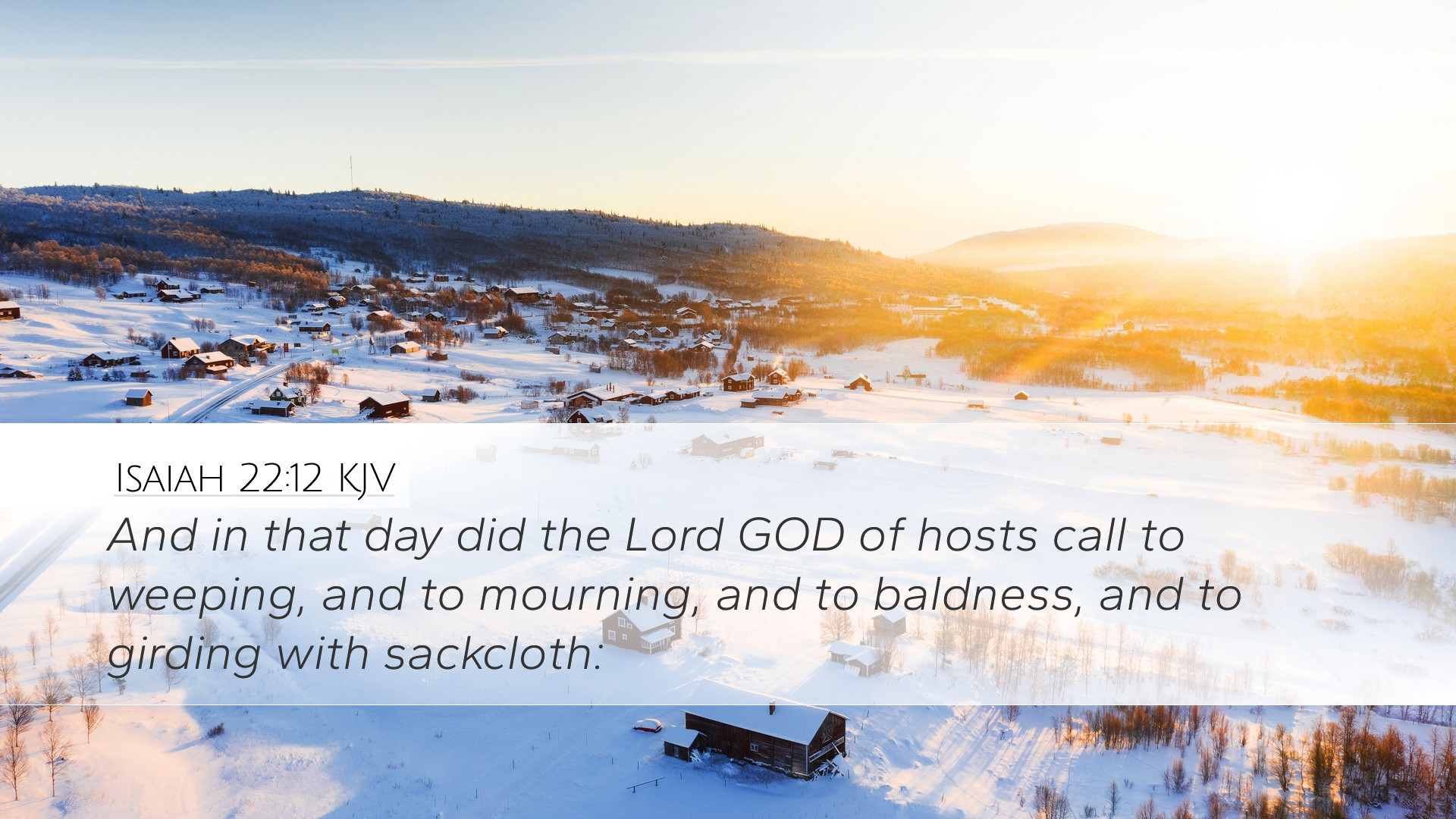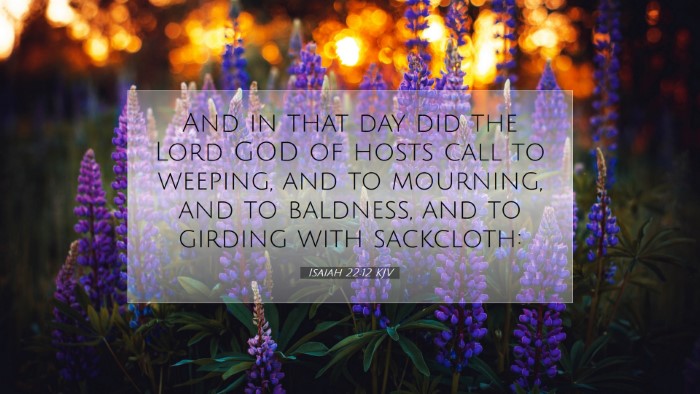Commentary on Isaiah 22:12
Isaiah 22:12 states:
"And in that day did the Lord God of hosts call to weeping, and to mourning, and to baldness, and to girding with sackcloth:"
Contextual Overview
The text of Isaiah 22 is set against a backdrop of impending judgment on Jerusalem. The prophet Isaiah reveals a significant moment when God calls His people to repentance and reflection. The historical context shows that Jerusalem was under threat, facing calamities that were both moral and physical in nature.
Commentary Insights
Matthew Henry’s Commentary
Matthew Henry expounds upon this verse by emphasizing the call to weeping and mourning, which signifies a time of deep distress and penitence. He remarks that God, in His providence, often calls His people to recognize their sinful state through such means.
- Call to Weeping: Henry notes that genuine sadness for sin is a pathway to restoration. It indicates a heart that is not callous but sensitive to divine displeasure.
- Mourning: This conveys a sense of loss that comes from recognizing estrangement from God due to sin. Henry connects this mourning with the anticipatory grief that points towards grace.
- Baldness and Sackcloth: Symbolically, these elements represent humility and submission. Henry elucidates that such external signs of grief reflect an internal reality—a heart broken before God.
Albert Barnes’ Notes on the Bible
Albert Barnes provides a historical and theological viewpoint on this passage. He highlights the seriousness of the call from God, reiterating that it is not only a command but also a reflection of the covenant relationship between God and His people.
- The Day of the Lord: Barnes emphasizes that "in that day" refers to a significant time in God's redemptive history. It is a day of reckoning, where God's judgment is evident.
- The Nature of God’s Call: He asserts that the call to mourning and weeping is a direct response to the people's unfaithfulness, showcasing God's desire for their repentance.
- Symbolism of Actions: The acts of baldness and sackcloth serve as both a sign of remorse and an earnest plea for forgiveness. This symbolism is deeply embedded in the traditions of the Hebrews as a communal acknowledgment of sin.
Adam Clarke’s Commentary
Adam Clarke elaborates on the prophetic nature of Isaiah’s declaration. He argues that Isaiah’s message points to a broader significance beyond the immediate historical context, hinting at the consequences of unrepentant hearts.
- Divine Call to Repentance: Clarke discusses how God’s call is an invitation rather than mere commandment, hinting at His desire to restore His people to Himself.
- Historical Importance: He connects the mourning portrayed in the verse to the historical events surrounding the fall of Jerusalem, emphasizing that such calamity should have led to national repentance.
- Means to Humility: Clarke stresses the importance of humility in repentance, noting that the outward expressions of grief (baldness, sackcloth) are essential for genuine spiritual renewal.
Theological Implications
This verse not only represents a historical event but also encapsulates vital theological principles relevant for contemporary believers:
- Repentance: The necessity of turning from sin is a recurring biblical theme. The call to weeping and mourning emphasizes penitence as a precursor to divine favor.
- Judgment and Grace: The pronouncement of judgment serves a dual purpose as both warning and hope. While God’s judgments may be severe, they are framed within His desire for restoration.
- Response to Divine Calling: Understanding God's call in both old and new contexts invites reflection on how today’s believers respond to God’s gentle or severe calls.
Concluding Thoughts
Isaiah 22:12 is a profound reminder of the importance of humility and the need for authentic repentance in the life of a believer. It challenges pastors, students, and scholars alike to ponder the depths of their response to God’s call. In a world where distractions abound, the call to weeping and mourning can lead to spiritual renewal if embraced wholeheartedly.


